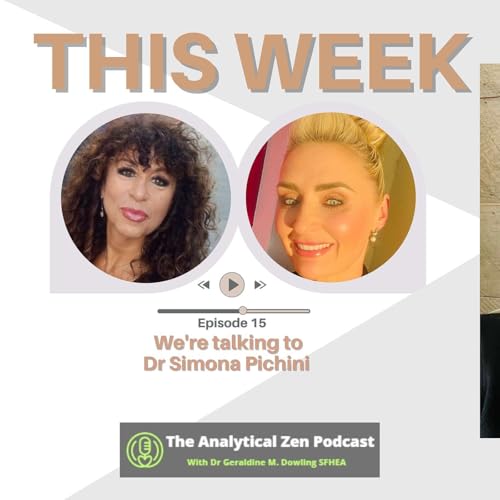
The Analytical Zen Podcast
Failed to add items
Add to basket failed.
Add to Wish List failed.
Remove from Wish List failed.
Follow podcast failed
Unfollow podcast failed
-
Narrated by:
About this listen
Biography and Research: See Orcid.org/0000-0001-8344-6582 (presenting 100+ academic works)
Dr. Geraldine M. Dowling SFHEA is an accomplished professional with over 20 years experience in forensic, analytical toxicology, food safety, drug residue testing, method validation, ISO17025 laboratory accreditation and more than 10 years experience in academia as an educator. She is an internationally recognised researcher. She is a Senior Fellow of the Higher Education Academy (SFHEA), awarded for excellence in teaching/research/leadership within higher education reflecting extensive experience and significant contributions to improving educational practices, research, mentoring professionals and enhancing the overall quality of teaching and learning in academic settings and in industry.
She is the creator and host of The Analytical Zen Podcast, an educational series designed to make complex scientific concepts accessible to both students and the general public (available on Spotify etc).
Dr. Dowling is currently elected Vice Chair (past Treasurer) of the United Kingdom and Ireland Association of Forensic Toxicologists (body represents forensic toxicology professionals in England, Ireland, Wales, Northern Ireland, Scotland and the Channel Islands). She is the International Association of Forensic Toxicologists elected regional representative for Ireland, a member of the Society of Forensic Toxicologists in America and elected member of the London Toxicology Group Committee. She has extensive experience in working/training professional staff and students in ISO17025 accredited national government laboratories in Ireland, including The State Laboratory, Teagasc, The National Dairy Science Laboratory, The Irish Equine Centre and The Marine Institute. She is a Principal Investigator supervising postgraduate students (PhD/MSc). Her research interests focus on analytical chemistry, lab accreditation, forensic science, forensic/clinical toxicology, metabolomics, medicine, flavoromics, food safety and education pedagogies.
Dr. Dowling was invited to give her expertise to a Irish Government working group titled the “Emerging Drug Trends and Drug Checking Working Group.” This government-supported initiative aim was to introduce safer, more informed approaches particularly through harm-reduction strategies rather than punitive or enforcement only methods.
Dr. Dowling is a contributing author, reviewer and editor across selected international journals eg Drug Testing and Analysis, Journal of Analytical Toxicology, Forensic Science Review, Journal of Forensic Research, Frontiers in Molecular Physiology etc. In addition, she has written, edited/co-authored four books.
Dr. Dowling is the Editor-in-Chief of The IACFT Journal, the official publication of the International Alliance of Clinical and Forensic Toxicologists (ISSN: 3088-6600), as well as the Editor-in-Chief of the Science Undergraduate Research Experience Journal (ISSN: 2990-8167).
She is a Honorary Professor at Kingston University, London UK, a Visiting Senior Lecturer at King’s College London, UK and an Honorary Senior Lecturer at the Cameron Forensic Medical Sciences Unit, Queen Mary University of London, UK. She formerly served as an Adjunct Assistant Professor at Trinity College Dublin's School of Medicine and as a visiting scholar at the National University of La Plata, Argentina.
Dr. Dowling’s work has had a lasting impact, with government agencies such as Ireland’s Marine Institute using her methods in aquaculture monitoring since 2006 and internationally the U.S. FDA adopting her research for monitoring non-steroidal anti-inflammatory drugs since 2011. This research continues to be applied and is still in use in 2025.
Please see Linkedln profile:
www.linkedin.com/in/geraldine-dowling-msc-pgdip-phd-sfhea-2b66b835
-
 Nov 29 202527 mins
Nov 29 202527 minsFailed to add items
Sorry, we are unable to add the item because your shopping cart is already at capacity.Add to basket failed.
Please try again laterAdd to Wish List failed.
Please try again laterRemove from Wish List failed.
Please try again laterFollow podcast failed
Unfollow podcast failed
-
 41 mins
41 minsFailed to add items
Sorry, we are unable to add the item because your shopping cart is already at capacity.Add to basket failed.
Please try again laterAdd to Wish List failed.
Please try again laterRemove from Wish List failed.
Please try again laterFollow podcast failed
Unfollow podcast failed
-
 28 mins
28 minsFailed to add items
Sorry, we are unable to add the item because your shopping cart is already at capacity.Add to basket failed.
Please try again laterAdd to Wish List failed.
Please try again laterRemove from Wish List failed.
Please try again laterFollow podcast failed
Unfollow podcast failed


